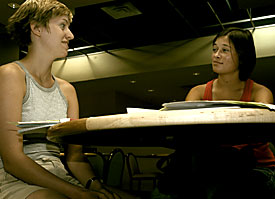 |
|
Joshua Sills\ Arizona Summer Wildcat
|
Education seniors Abbi Logdin and Kelly Campbell share some tips and secrets for incoming freshmen.
|
|
By Ian Musil
Arizona Summer Wildcat
Wednesday July 23, 2003
Campus secrets, from the classroom to the Mall, revealed
Coming to the University of Arizona can be a scary move for incoming freshmen that don't know the ins and outs of life on campus. However, there are about 32,000 veteran Wildcats who have all been there before, and they have some advice for students coming the UA for the first time.
Their message: don't be afraid to try anything at least once.
Upperclassmen said new Wildcats should look around campus the minute they arrive for organizations that peak their interest and get involved.
"Be proactive in pursuit of everything that entails a college education," said Physiology senior Pam Sobel.
Open-mindedness is something every freshman should bring to college, according to political science junior Marisol Caratachea, who added that first-time Wildcats have the opportunity to make lifelong relationships while they're here.
"Go to activities, meet a lot of people. Be outgoing. You'll stay in contact with many of the people you meet for a lifetime," Caratachea said.
Physiology senior Katrina Brewer said freshmen shouldn't be afraid to pursue their interests. According to Brewer, procrastination, a common factor responsible for poor class performance, will just as easily spoil the extra-curricular college experience.
"Get involved, don't wait," Brewer said. "Look for internships and study abroad opportunities."
Mike Buffington, a visual communication senior, said most students overestimate the time spent preparing for class and could benefit from taking on more outside the classroom.
"You can usually handle more than you think," Buffington said. "Even if you don't have time, volunteer somewhere. It becomes a break for yourself."
Brian Klapp, a molecular and cellular biology senior, said being open minded is just as important when deciding on a major. According to Klapp, a willingness to try new things is important because experience is a student's most valuable tool when planning for a degree.
"Don't get locked into one major. Get exposure to everything. Change at least once," Klapp said.
Sue Whitworth, advisor for general biology (which is one of the largest degree programs at the UA), said the students themselves, are often the best resource when they don't know which field of study to pursue.
"The first thing they should do is think about what they like and what they are good at and then go to advisors in the majors they think they might be interested in," Whitworth said. "We are here to talk to students and help them explore their interests."
Education senior, Kelly L. Campbell said this kind or approach was effective when she set out to declare a major.
"I went around to all the colleges I was interested in and made appointments," Campbell said. "That helped me decide on my major."
However, if students can't determine academic interest on their own, Whitworth suggested they make an appointment with the Advising Center for Exploratory Student (ACES). ACES identifies students' interests, values, skills, and personality traits and uses those characteristics to guide students to appropriate majors.
Once a student selects a major, they should be proactive as they try to plan a schedule and register for class, the veterans said.
Brewer suggested students develop good relationships with their advisors so they can get through school in four years.
"Go to your advisor, develop a relationship," she said. "I need them to know what classes to take. Without them, I'd be behind."
Caratachea said "flexibility" is an element to keep in mind when developing the ideal schedule.
"Have lots of options. Make plans B and C just in case the classes you want are full," Caratachea said.
Sobel pointed out a valuable option for students who find the classes on WebReg full.
"Go to classes, ask professors to manually add you to their classes," Sobel said. "They are usually accommodating to interested students. "
When it comes to general education requirements, using word-of-mouth and consulting students who've completed gen-eds is the best way to find the right classes, some veterans said.
"Ask around. Only take gen-eds from professors who former students say are good or easy," Brewer said. "Know which teachers are good when you register."
Other upperclassmen stressed the value of developing relationships with professors and advisors within a student's field of interest. According to Carratachea, meeting in person with professors and advisors improves grades and helps students get into graduate school.
"Go to office hours. Take the time to know your professors and TA's personally," she said.
Buffington agreed, "Go and talk to advisors, they are here to help you."
Although students agree that it is important to stay as active as possible, they said sleep is not something a student should cut out of his or her schedule.
"Remember to sleep. Some nights we stayed up Ītil 5 a.m.," said Caratachea, pointing to Brewer. "We sometimes had trouble getting up for early morning classes."
Klapp agreed and said there are several important things to remember when registering for the first time.
"Don't take morning classes or Spurgeon's o-chem," Klapp joked. "And remember, elementary education classes have the most girls."
Upperclassmen also said that while school is important, new students should never take things too seriously.
"Have fun at UA," Campbell said. "After all, you're only here for four years."

